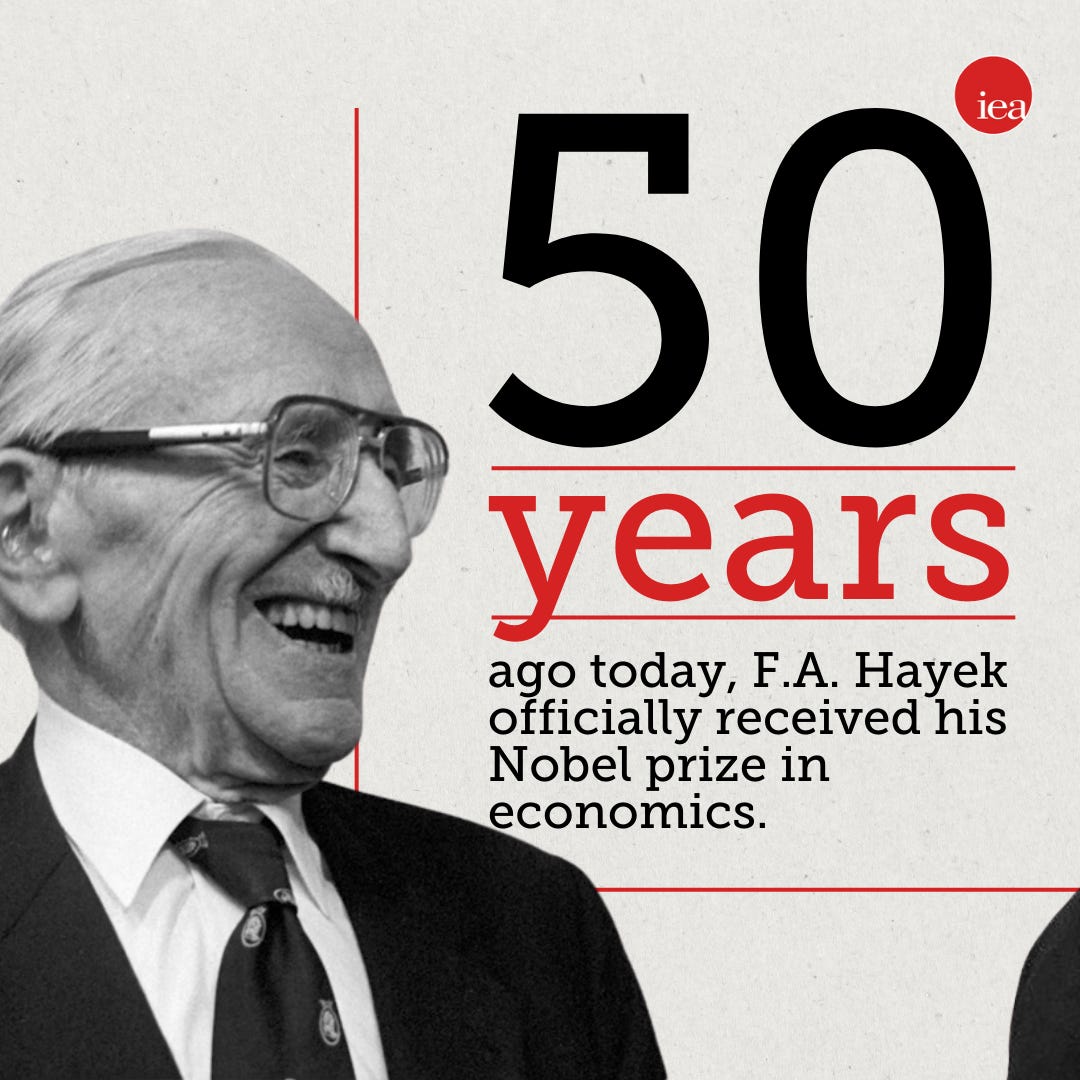|
 |
Wednesday 11th December marks 50 years since F.A Hayek won the Nobel prize in economics.
Hayek’s ideas on economic freedom and the dangers of central planning set the intellectual foundation for the 1980s.
Margaret Thatcher herself reportedly slammed The Constitution of Liberty by Hayek on a desk at a Conservative Party meeting, declaring “This is what we believe!”
This Government may not share Thatcher’s admiration for F.A Hayek, but if they are serious about meaningful economic reform, they should listen to what he had to say.
To mark 50 years since F.A Hayek’s Nobel prize win the Institute of Economic Affairs, the think tank Hayek helped found, has published its latest book “Hayek’s Nobel: 50 years On”.
The book revisits Hayek’s pivotal work, and its lessons that remain as crucial today as they were half a century ago.
Edited by IEA Editorial Director Kristian Niemietz, the publication republishes Hayek’s Nobel Prize lecture, ‘The Pretence of Knowledge’, with new reflections from leading economists Bruce Caldwell, Peter Boettke, and Donald Boudreaux.
Not only did Hayek eventually go on to inspire Prime Minister Margaret Thatcher, but he inspired the founding of the IEA itself. The Road to Serfdom inspired the IEA’s founder, Sir Antony Fisher, to establish the think tank. Hayek steered Fisher away from his political ambitions and told him to instead become an “ideas entrepreneur”.
As Dr Niemietz notes in the foreword, “if [the IEA] were to name ourselves after one person, we would undoubtedly be the F.A. Hayek Institute. Hayek’s vision of dispersed knowledge, individual liberty, and the trial-and-error process of free markets forms the bedrock of our mission to promote understanding of the fundamental institutions of a free society.”
Today, economic challenges have prompted Governments across the world to reconsider centralised planning and government intervention. Hayek would certainly not approve of the October budget, which significantly increased taxes on businesses. From inflationary policies to misguided intervention, the “pretence of knowledge” continues to threaten economic stability.
“As politicians flirt with heavy-handed interventions, they would do well to revisit his work and recognize that markets, not bureaucrats, are best equipped to manage the complexity of modern economies”, says Dr Niemietz.
Dr Tim Besley, School Professor of Economics and Political Science at the London School of Economics and Political Science (LSE), said:
“Congratulations to the IEA for helping to keep Hayek’s flame burning fifty years on from his Nobel prize. These essays show just how influential his ideas remain and will help to convey some of the messages from his work to the next generation and beyond.”
Bruce Caldwell, book author and Research Professor of Economics at Duke University, said:
“Hayek’s warnings about the dangers of scientism are, unfortunately, as relevant today as they were when he wrote about them in his Nobel Prize address 50 years ago. We ignore him at our peril.”
Peter Boettke, book author and Distinguished University Professor of Economics at George Mason University, said:
"Hayek’s core arguments about the price system and the market economy, as well as the liberal principles of political economy and justice, were among the most
creative advances in economic science in the 20th century, and their scientific insight and social philosophical wisdom remain among the most enduring contributions in the history of political economy."
You’re currently a free subscriber to Insider. For the full experience, upgrade your subscription.
Paid subscribers support the IEA's charitable mission and receive special invites to exclusive events, including the thought-provoking IEA Book Club.
We are offering all new subscribers a special offer. For a limited time only, you will receive 15% off and a complimentary copy of Dr Stephen Davies’ latest book, Apocalypse Next: The Economics of Global Catastrophic Risks.

